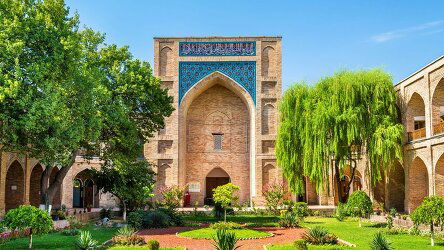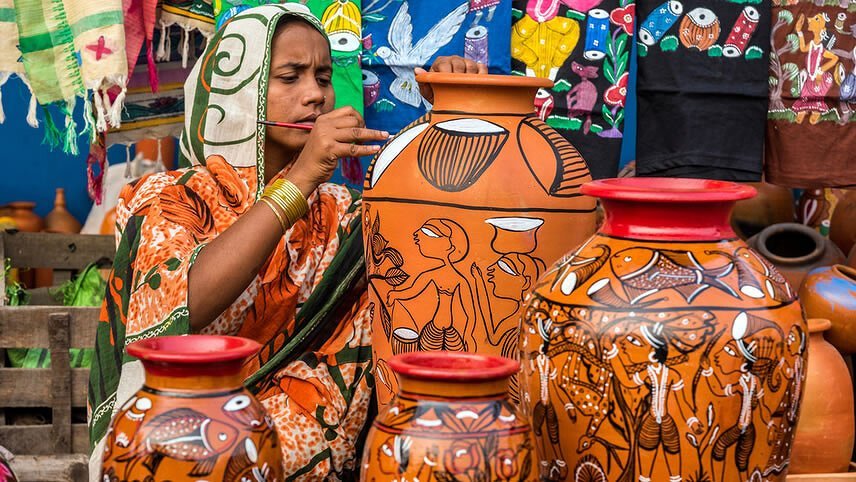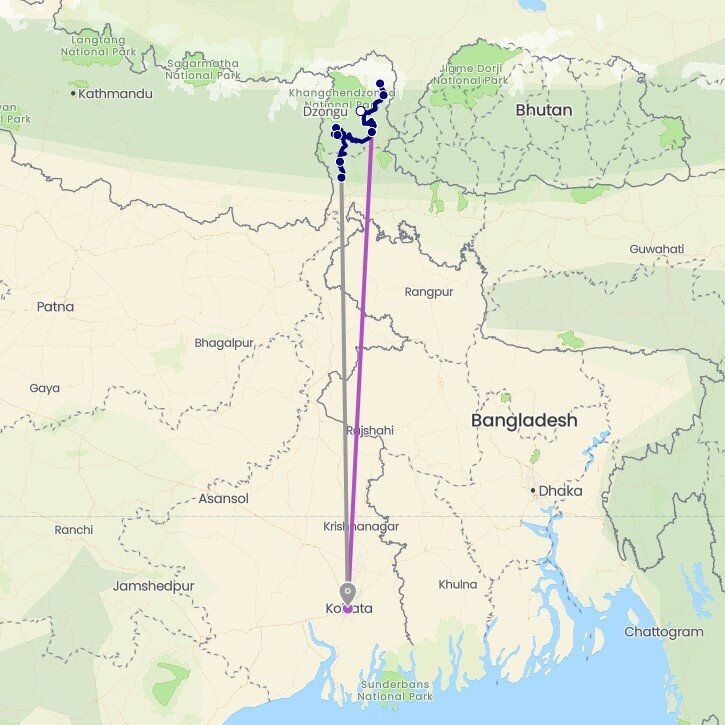Overview
Explore unspoiled towns, wild landscapes of exotic flora and fauna as well a homestay experience in a traditional Lepcha village of Dzongu. Embrace...read more the stark natural beauty of the Yumthang Valley, with its sacred lakes and ornate Buddhist monasteries. Take a train through the hustle and bustle of Kolkata where you will then join the Durga Puja festival, the largest and most vibrant festival of Bengal. The lanes and parks of Kolkata transform into an open art exhibition as various groups compete to set up lavish and innovative pandals (makeshift prayer arrangements), each displaying an interpretation of the Goddess Durga. The ten-armed Goddess saved the world from evil when she slayed the demon, Mahishasur. Be guided through this mesmerising spectacle of living tradition, participating in the festivities alongside the devout. Be prepared for an amazing journey of discovery, cultural experiences, local life, cuisine and explore the meaning and forms of spirituality, all mixed with unsurpassed scenery.
Itinerary
Welcome to India! Upon arrival into Kolkata, you will be met and transferred to your hotel. The remainder of the day is yours at leisure.
The city of Kolkata's name is derived from the Bengali term Kolkata, the name of one of three villages that predated the arrival of the British, in the area where the city eventually was to be established. Located on the east bank of River Hooghly, Kolkata is the capital of the Indian state of West Bengal. It is also the commercial, cultural, and educational centre of East India, while the Port of Kolkata is India's oldest port as well as its sole major riverine port. The city's documented history begins with the arrival of the English East India Company in 1690, when the Company was consolodating its trade business in Bengal. Under the East India Company and later under the British Raj, Kolkata served as the capital of India until 1911, when its perceived geographical disadvantages, combined with growing nationalism in Bengal, led to a shift of the capital to New Delhi. The people of Kolkata tend to have a special appreciation for art and literature; its tradition of welcoming new talent has made it a ‘city of furious creative energy'. For these reasons, Kolkata has often been dubbed as the Cultural Capital of India or the Literary Capital of India. Stay: Hotel Astor or similar
Following breakfast this morning, you will be transferred to the airport for your flight to Bagdogara. Upon arrival you will be met and transferred to Kurseong. This evening, enjoy a scenic walk along the military road built by the British in the 1770's. Stay: the Cochrane Palace or similar (B/D)
Enjoy breakfast at your hotel this morning before enjoying a half day visit to the Tea Garden. Here you can observe the processing and manufacturing of the world renowned Darjeeling tea.
Early this afternoon, board the Darjeeling Toy Train from Kurseong and enjoy a ride of a lifetime in this World Heritage Site and let the scenic views mesmerise you.
A journey on the Toy Train is considered the most romantic approach to the Himalayas, as this small steam locomotive slowly meanders its way through the landscape. Once you disembark the train at Ghoom, enjoy a walk to Darjeeling. Stay 2 Nights: the Dekeling Resort or similar (B/D)
Rise early this morning to enjoy a one hour walk to Tiger Hill, where you will witness sunrise over the snowy peak of Kanchenjunga – the world's third highest mountain. Enjoy a tea break before returning to your hotel for breakfast.
Following breakfast, head out to explore Darjeeling. Your first visit is to the Himalayan Mountaineering Institute, which as well as conducting training courses, also houses a wonderful collection of equipment used in various mountaineering expeditions.
From here, continue onto the Zoological Gardens. Home to some of the rarest species of animals and birds, it is the only zoo in India to have Siberian Tigers and Red Pandas.
Your next stop is the Tibetan Refugee Camp, established as a centre for those who had fled Tibet with the Dalai Lama after the Chinese invasion. This self-help centre has been developed as a workshop for the manufacture of handicrafts. (B/D)
This morning you will embark on a scenic drive (approx. 4 hours) from Darjeeling to Pelling. In the afternoon, enjoy a visit to the Pemayangtse Monastery.. Planned, designed and founded by Lama Lhatsun Chempo in 1705, it is one of the oldest and premier monasteries of Sikkim, and the most famous in west Sikkim.
Continuing on, explore Rabdentse which was the second capital of the former kingdom of Sikkim from 1670 to 1814. The capital city was destroyed by the invading Gurkha army, leaving only ruins of the palace and chortens which once stood here. Stay: the Norbughang Resort or similar (B/D)
This morning following breakfast, you will visit Pelling, stopping enroute at Khechiopalri Lake. Originally known as Kha-Chot-Palri, this lake is sacred to both Buddhists and Hindus, it is believed to be a wish fulfilling lake.
From here, enjoy a leisurely walk through the woodland trails to Yuksom. Stay: the Yuksum Residency or similar (B/D)
Another morning drive today as you head towards Gangtok, visiting Tashiding Monastery on the way. Located on top of a hill, rising between the Rathong chu and the Rangeet River, the views from this Buddhist monastery are truly spectacular. Stay: the Netuk House or similar (B/D)
This morning following breakfast we drive approx. 3hrs to Lachung. Upon arrival the rest of the day is yours at leisure to relax and take in this special part of India. Stay 2 Nights: Yarlam Resort or similar (B/L/D)
Today you will explore the stark natural landscapes of the Yumthang Valley. Popularly known as the ‘Valley of Flowers', it is home to the Shingba Rhododendron Sanctuary, which has over twenty-four species of the rhododendron, the states flower.
Make the most of the Yumthang Hot spring which is perched at an altitude of over 11,800 feet above the sea level. Lying close to the course of Lachung river, this hot water spring can be accessed after a short five minute walk from Yumthang village. (B/L/D)
This morning you drive from Lachung to Dzongu. Dzongu is an official reserve for the Lepcha community and is largely untouched by tourism. Colourful Buddhist flags float in the mountain breeze, carrying the prayers of the Lepchas to their Gods. The contoured paddy fields add more colours to the picture perfect scenery. The beauty of Dzongu is complimented by the weight and depth of its heritage carried by the Lepcha people.
This evening, spend the night with a local family in a traditional homestay. Stay: Homestay (B/L/D)
This morning, make the most of experiencing the local lifestyle and culture of the Lepcha Community before it time to farewell your host family and depart for Gangtok. Stay 2 Nights: the Netuk House or similar (B/D)
Following breakfast, enjoy a half day excursion to Rumtek Monastery. Rumtek Monastery is the largest monastery in Sikkim and is home to the monk's community, the place where they perform the sacred rituals and practices of the Karma Kagyu lineage.
This afternoon, visit Tashi Ling which provides an astounding view of the Kanchenjunga range. Here lies the Tashi Ling monastery mostly known for its ‘Bumchu' (Sacred Pot). This pot contains holy water which has never run dry for last 300 years.
You will also visit the Namgyal Institute which was built to promote research in Mahayan Buddhism and Tibetan language and traditions. From here, continue onto Tsuk La Khang – a depository of a large collection of scriptures, this is the principal place of worship and assembly for the local Buddhists. (B/D)
This morning drive from Gangtok to New Jalpaiguri. Enjoy some time to explore before you board the train this evening. Depart New Jalpaiguri by train ‘Kanchan kanya' Express to Kolkata. Stay: on board (B)
Arriving early in the morning, you will be met at the station and transferred to your hotel. After breakfast, you will depart to visit Kumartuli which is a traditional potters' quarter. This Kolkata neighbourhood not only supplies clay idols of Hindu gods and goddesses to barowari pujas in Kolkata and its neighbourhoods, but a number of idols are exported.
Later on enjoy Pandal Hopping. The highlight of Durga Puja in Kolkata is no doubt visiting the many different displays (pandals) of Goddess Durga, each with a unique theme. There are thousands of pandals in Kolkata so it's only possible to visit a fraction of them.
The streets are over-flowing with men dressed in their dhoti's (unstitched garment for lower body) and women in their distinctive white and red saris. The nights are a glittering affair with light shows, elaborate arrangements and crowds that throng the cityscape. Stay 2 Nights: Astor Hotel or similar (B)
Early this morning, at the base of the Howrah Bridge, on the Calcutta side, is the city's bustling wholesale flower market. Flowers are an essential part of life in the city, they are bought not just for temple prayers but also for wedding decorations, events and festivals. Each god or goddess has their own favourite flowers and leaves. Walking through the flower market is a colourful, fragrant experience.
This afternoon, see the immersion of the Durga Idol. On the last day of Durga Puja, known as Dashami, the festivities commence with married women placing red sindoor (powder) on the idols of Goddess Durga. They then smear it on each other. In the evening, the idols are immersed in the water. (B)
The day is yours at leisure following breakfast until it is time for you to be transferred to the airport for your onward flight. (B)
Trip Inclusions
- Enjoy a journey on the Toy Train through rolling tea plantations into the Himalayas
- Visit a Tibetan Refugee Camp
- Soak in the natural Yumthang hot springs
- Enjoy a traditional homestay experience with a remote Lepcha family
- Explore the active Rumtek Monastery, home to many practicing monks
- Experience the annual Durga Puja Festival in Kolkata
- Return airport transfers
- Domestic flight from Kolkata to Bagdogara
- 14 nights accommodation, 1 overnight train
- 15 Breakfasts, 3 Lunches, 11 Dinners
- Services of an English speaking local guide
- Transportation in a private air conditioned vehicle
- Entrance fees as per the itinerary
- Sightseeing as per the itinerary
- International flights
- Visas
- Travel and medical insurance
- All services, meals other than those indicated above
- Any changes to the proposed and confirmed program.
- All items of a personal nature e.g. drinks, laundry, telephone calls, tips etc
- Accommodation, itinerary and inclusions subject to change.
- Disruptions to itinerary may occur.
Availability
Your Global Journeys Travel Advisor will check the availability of your departure date when you enquire. Additional savings may apply. We guarantee the lowest price in Australia. T&C’s apply.
Tour & cruises prices are per person. Prices shown have savings applied, are subject to availability and may be withdrawn at any time without notice. Pricing and trip details are correct at this point in time, however are subject to confirmation at the time of booking and are subject to change by Crooked Compass. For cruise itineraries, cabin images are sourced from Crooked Compass. These should be treated as indicative only. Cabin inclusions, upholsteries and room layout may differ to the image(s) shown depending on the ship selected and your sailing dates.
Similar Tours

16 Days Luang Prabang Siem Reap
Operated By: Crooked Compass

15 Days Tashkent Dushanbe
Operated By: Crooked Compass







